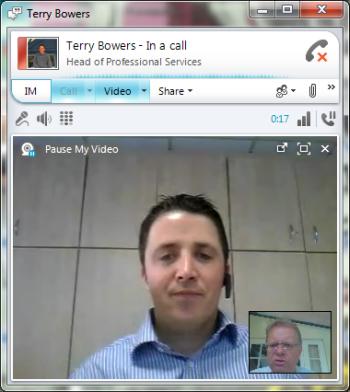 Dean Elwood runs the industry leading website voipuser.org. Over the 6 years this has been going Dean has come into contact with most of the major thought leaders in the communications space. He has also seen many of the new developments in VoIP play out in the form of discussion and comment on the website’s forum which has given him an unique insight into the workings of the VoIP industry.
Dean Elwood runs the industry leading website voipuser.org. Over the 6 years this has been going Dean has come into contact with most of the major thought leaders in the communications space. He has also seen many of the new developments in VoIP play out in the form of discussion and comment on the website’s forum which has given him an unique insight into the workings of the VoIP industry.
TD I understand that for many of us there was life before VoIP and that you were in the legal profession. How did this enormous career step change come about?
DE Organically. 16 years of corporate law has its way of taking toll on you. I always maintained an interest in technology and looking back that’s really where my heart was. The defining moment happened in 2000 when I originally built a GSM conferencing system for two-way radio. VoIP User came about because of that in 2003.
TD VoIP has gone from being in the domain of the technology enthusiast (quite a long time ago now) to being mainstream. Has the growth in voipuser.org subscribers reflected this and how has the nature of the discussion topics changed in this time?
DE That’s an interesting question and one I re-visit myself from time to time. VoIP User has experienced a growth rate average of 50 new members/subscribers per day and it has not deviated from that in 6 years. It’s still the same as it was at day one. I’m not sure I can explain the reason why, other than to say that I feel VoIP User is an attraction to the early adopter and this maybe represents the rate of growth in the early adopter space.
We have noticed a change in the discussion topics to more mass market type threads however. I’ve noticed that in particular in the business space – a lot more IT professionals realising they are having to become PBX specialists due to the fact that telephony is more and more falling into their remit. These days if you’re an IT manager, that will typically involve you in voice services. 5 years ago that was a role relating to PC hardware and software management. That’s a change which is very obvious when you look at some of the threads in our Business Forum.
TD Would you say that you had had a scoop of any kind on voipuser?
DE Several over the years, but recently as we’ve become a bit more mainstream we tend to get embargoed. I had the scoop on GrandCentral/Google Voice back in December but was asked (very nicely) not to publish as it would interfere with Google’s marketing plan. So I obliged which is what we typically do. We do not wish to be seen in the same light as traditional media – we’re not here to interfere with marketing plans, we’re here to inform users. So with that one we waited until it was public and then talked about it. What I did do was have a detailed piece pre-written and ready which sat on my laptop for about 2 months awaiting the go-ahead. I prefer it that way. Making scoops can mean making enemies of marketing directors 😉
TD In the early days VoIP service providers had pride of place at conferences such as Voice on the Net (VON) and would attract the attention of every single device and handset manufacturer in the world. Nowadays there are hundreds if not thousands of ITSPs and almost as many device manufacturers. Do you think that it is too late for new players to get in the game.
DE I don’t think being too late is the issue; I think the issue is understanding what “the game” is. From my perspective there are huge opportunities. For example, the compliance and regulatory space is wide open. Life is getting tougher on lawyers and accountants to produce audit trail evidence of conversations.
There are plenty of ways that a niche specialist could build a business in that space alone and there is precious little out there serving that customer base. I think a product that serves those specific industries and integrated SMS and voice call trails into existing systems (MimeCast for example) would do extremely well.
That’s a simple example of providing a solution to a very real-world problem and I still feel there is scope for that approach in this space. Niche yourself, attack a specific market and do it extremely well. Long gone are the days of wanting to be the next Vodafone or IPO or Skype level sale, but that’s not to say that there is no room left. I think there’s plenty.
TD What in your mind have been the major milestones in the VoIP industry?
DE I could say the obvious – Skype sale to eBay, ubiquity of broadband and of SIP etc. But the truth is I don’t feel we’ve really seen any major milestones yet from a consumer perspective. VoIP as a technology is still yet to prove it’s value in terms of offering advantages over TDM.
At the moment it remains an alternative technology for voice and that’s all (with most providers playing on the cost-saving end). It’s not yet become an alternative *product* in it’s own right. That needs to happen. That would be a real milestone.
TD What is the recipe for success for a VoIP business today?
DE Understand your customer. Release products that are a direct reaction to their specific requirements or solve their specific problems. Don’t release products or buy other companies simply because your engineering department thinks it’s a “cool” technology.
Technology is meaningless without a valid product reason for its existence and a sales channel to get it out. We saw a lot of meaningless and/or cheap minutes plays in 2008. The only things that people will buy from you in 2009 are products that solve specific problems your customer or target market is experiencing.
Martin Geddes (BT Director of Product Strategy) is someone that understands this very well. His headline statement is “People are expensive, minutes are cheap”. If you can get an employee off the phone 20 minutes more quickly then your customer (as an employer) will be quite happy paying you 5p/minute more than your competitor is charging because the customer saves real money, not pennies. That’s where the profits lie in this business, not in cheap minutes. If you’re in the latter space, watch out for the price wars and high customer churn rates. VoIP as a technology is actually an enabler to doing clever things like call avoidance and dynamic call control and routing.
TD VoIP has come a long way since the beginning. Quality of Service has all but disappeared as an issue and we are now starting to see VoIP calls with much better sound quality than traditional PSTN calls. How much farther do you think VoIP has to go?
DE I’m not convinced that QoS has all but disappeared. I still have clients experiencing this issue today when not in control of the last-mile of connectivity (where most of the QoS problems actually arise). Timico solves this problem because you’re in control of that last-mile as an ISP, so QoS is something that you can offer your customer and perhaps it’s therefore something you don’t see anymore. That’s a good place to be in, but many are not in that position and have to look elsewhere for their value adds.
Moving further forward, I think hi-def audio is a good place to be in. That really makes a difference, especially in conference calls or when you’re speaking to people with strong accents or native language differences. The clarity of hi-def solves the problem of understanding someone in those situations. It is something that requires the support of hardware manufacturers though, for obvious reasons, to really come to fruition.
Most ITSP’s that I speak to really want to do hi-def, but don’t have the hardware support to make it possible for their customers. It’s a critical mass/chicken and egg problem but I do think that loop will be broken. Jeff Pulver is going all out to try and break that loop at the moment as you know.
TD Do you think the term VoIP has had its day? The world seems to have moved on to using the term Unified Communications and even this in my mind is inadequate as a description of the experience that users are going to get with new communications technologies and tools. How should we be describing this new experience?
DE VoIP as a buzzword and sales point has definitely had its day. If you take 100 consumers and ask them what VoIP means 95 of them will respond with “Skype” in the sentence. The other 5 are early adopters/technology enthusiasts. Skype achieved that brand position by productising the technology. Unified Communications is an inadequate expression only because the 95% don’t understand what you mean. Nobody has productised it yet.
If you say to an accountant that their voice calls can be logged into the same compliance system as their email they’ll understand the point and see the value to them. That’s what productisation is. I don’t believe there is any single expression that will make that point to the mass market. Like Skype, I believe this movement will be product-led and not technology or catch-phrase led. There is an opening right now for a brand to immerse itself into the UC space in the same way that Skype immersed itself into the VoIP space or Google in the search space.
TD We do live in a world where volumes are almost the be all and end all. Who do you think will be the major players in the global VoIP game. A couple of players seem to be nosing ahead of the pack, in the consumer market at least.
DE I only see one player ahead of the pack at the moment in the consumer space and that’s Skype. Everyone else, as Jeff Pulver remarked at the ITSPA 2007 event, is “just noise”. Whilst there is money to be made in the noise it’s becoming much harder in the economic downturn that we’re experiencing. I honestly don’t believe for a moment that many of the tech-household names that we know in this space will be around in Q1 2010. I still feel the market is wide open for a clever product play and I think it will take that to ensure survival.
TD You personally produced an embedded client for Truphone for Facebook. Where else are we likely to see such clients and will we recognize them as such? Is the VoIP enabled fridge any nearer happening (it being one of the trendy futuristic uses of VoIP for almost the whole 10 years I have been in the industry).
As soon as the VoIP enabled fridge is available you and I will be buying one, so there’s two customers! I don’t think we need to recognise what they are, as consumers, I think we only need to recognise value in the product. We don’t really care what’s driving it or how it works, just that it adds value somehow. If that value is simply that I can make hands-free calls from my kitchen then that’s great. That might be all that device needs to do to satisfy me as a customer. In that case it could be my toaster – we don’t have to stop at fridges!
I do think we’ll see more voice oriented applications within the social networking space and there is definitely an opportunity to be capitalised on there. Second Life is currently routing one billion minutes per month between its users, for example.
TD Where is it all going?
DE Voice minutes are a commodity. I think many business models exist with a long history that shows us what happens when a service gets commoditised so we don’t really need to guess, we can just look back.
Aviation is one such example. When you look at times in history when the airline industry has hit rock bottom (through price cuts in times of trouble), a few go bust, several consolidate and a scarce few do well. The ones that do well are the ones that are selling an expensive service with a value add. They rise above the commodity price by adding value to the raw service.
During a terrible climate for the aviation industry between 1999 and 2003 the airlines that did well looked at user-experience and made changes there. They did video on demand. They created rapid check-in processes. They saved you time (see Martin Geddes quote above) and gave you good in-flight entertainment which meant the time you had to spend (in flight) at least had some value. A good end to end user-experience.
That’s all they needed to do to pursuade flyers that it was worth spending the extra money to fly with them. They started selling expensive airmiles, coupled to value-adds focussing on the value of peoples time.
I see the telecoms industry going the same way. But while everyone else is jumping on to the cheap minutes bandwagon and causing commoditisation the best thing to do is the opposite. Be in the expensive minutes business with a value add and great user-experience that saves your customers more money than cheap minutes alone. All of this really just equates to recognising the value of your customers time and recognising that VoIP is a technology that has the capability to rise above the low-end proposition of cheap minutes.
 Philip Davies MP is a libertarian Conservative and as a result is one of my favourite MPs. This means he’s often at polar opposites to Her Majesty’s Opposition and an uncomfortable bed fellow with their coalition partners. That makes it even more incredible that the amendment was gladly supported by both the Shadow Minister, Helen Goodman MP and Julian Huppert MP (Liberal Democrat Member for. Cambridge and a good advocate for the technological community). A rare moment of cross party backbench support that, alas, was defeated without Government support, which is still backing the self regulation horse.
Philip Davies MP is a libertarian Conservative and as a result is one of my favourite MPs. This means he’s often at polar opposites to Her Majesty’s Opposition and an uncomfortable bed fellow with their coalition partners. That makes it even more incredible that the amendment was gladly supported by both the Shadow Minister, Helen Goodman MP and Julian Huppert MP (Liberal Democrat Member for. Cambridge and a good advocate for the technological community). A rare moment of cross party backbench support that, alas, was defeated without Government support, which is still backing the self regulation horse.


